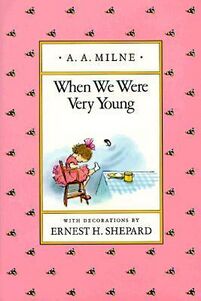Course:When We Were Very Young by A.A. Milne
| CRWR 501P 003 |
|---|
| Advanced Writing of Poetry |
|
| Important Course Pages |
| Categories |
When We Were Very Young by A.A. Milne
When We Were Very Young is a book of children’s poems by A.A. Milne published in 1924. While Milne is most well-known for the children’s classic Winnie the Pooh, this earlier work was significantly more prominent in my household and certainly formed the way I write poetry. In this collection, Milne writes short poems which usually rhyme and employ some pattern of line. As with much verse written for children, the focus is on absurdity and fun-to-read sound patterns.
The following is a poem from When We Were Very Young:
Lines And Squares
Whenever I walk in a London street,
I'm ever so careful to watch my feet;
And I keep in the squares,
And the masses of bears,
Who wait at the corners all ready to eat
The sillies who tread on the lines of the street
Go back to their lairs,
And I say to them, "Bears,
Just look how I'm walking in all the squares!"
And the little bears growl to each other, "He's mine,And the little bears growl to each other, "He's mine,
As soon as he's silly and steps on a line."
And some of the bigger bears try to pretend
That they came round the corner to look for a friend;
And they try to pretend that nobody cares
Whether you walk on the lines or squares.
But only the sillies believe their talk;
It's ever so ‘portant how you walk.
And it's ever so jolly to call out, "Bears,
Just watch me walking in all the squares!"
Strangely, I read poetry more often as a child than as an adult. "Line and Squares" was my favourite growing up, closely followed by “Buckingham Palace” and “The Four Friends”. My father read -- and sometimes recited, when the book wasn’t available -- these poems to me at bedtime. After a while, I started to memorise them, and I would read alongside him. These nighttime readings were my foundation of language; I learned to read by following along with my father’s voice and the words on the page. To this day, the “voice” I hear in my head when reading is my father’s.
Milne’s verse instilled in me a love of sound patterns, rhyme, and rhythm that is a driving force behind my poetic practice. When I read poetry as an adult, I am drawn to poems that employ the same fun-to-read elements. When I write, I look for ways to implement rhyme and alliteration, along with other ways to add audible interest. The below poem from 2018, while lacking in many ways, demonstrates my use of continuous rhyme. It might be hard to believe that I had fun writing this poem given the subject matter, but the writing of it helped me to develop a consistent writing process. Now, sometimes when I’m stuck, as I was when I wrote “A Letter From When I Can’t Stop”, I choose a word and Google rhymes for it. If enough suitable rhyming words present themselves, I construct a poem that uses every possible word I found. Behold the result:
A Letter From When I Can’t Stop
I’m eighteen
in twenty-eighteen
and people are finding new ways to have nicotine and blowing that
bubblegum cloud of spite into your face, and
gasoline
is too expensive for this car I can’t afford because I’m only eighteen
and the world is cruel and I’m
broke but
I need this machine to get me to school where
I can’t focus because I think I have
ADHD
but never got tested so I can’t take amphetamines
and it’s okay
because I still get straight A’s
and I’m sweet
like bubblegum
so no one really cared enough to ask me
if I’m paying attention
but it’s been eighteen years of living
in this labyrinthine world
and I’m coping
not focussing
but coping
so
I’m sitting here in someone’s nicotine bubblegum cloud
just wanting to be seen,
eighteen,
only eighteen,
someone notice me,
it’s twenty-eighteen and I need
something,
antidepressants, an attention span, attention,
something,
anything.
Anyone.
Please.


